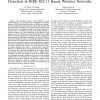Free Online Productivity Tools
i2Speak
i2Symbol
i2OCR
iTex2Img
iWeb2Print
iWeb2Shot
i2Type
iPdf2Split
iPdf2Merge
i2Bopomofo
i2Arabic
i2Style
i2Image
i2PDF
iLatex2Rtf
Sci2ools
INFOCOM
2011
IEEE
2011
IEEE
An analytical approach to real-time misbehavior detection in IEEE 802.11 based wireless networks
—The distributed nature of the CSMA/CA based wireless protocols, e.g., the IEEE 802.11 distributed coordinated function (DCF), allows malicious nodes to deliberately manipulate their backoff parameters and thus unfairly gain a large share of the network throughput. The non-parametric cumulative sum (CUSUM) test is a promising method for real-time misbehavior detection due to its ability to quickly find abrupt changes in a process without any a priori knowledge of the statistics of the change occurrences. While most of the existing schemes for selfish behavior detection depend on heuristic parameter configuration and experimental performance evaluation, we develop a Markov chain based analytical model to systematically study the CUSUM based scheme for real-time detection of the backoff misbehavior. Based on the analytical model, we can quantitatively compute the system configuration parameters for guaranteed performance in terms of average false positive rate, average detection de...
Related Content
| Added | 21 Aug 2011 |
| Updated | 21 Aug 2011 |
| Type | Journal |
| Year | 2011 |
| Where | INFOCOM |
| Authors | Jin Tang, Yu Cheng, Weihua Zhuang |
Comments (0)

